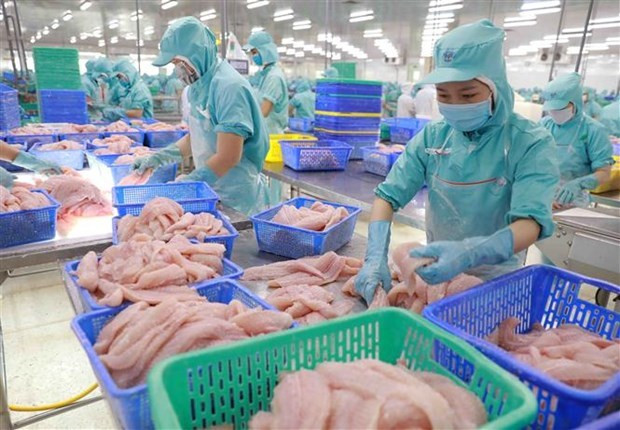
Workers process tra fish for export at an establishment of Sao Mai Group in the southern province of Dong Thap. (Photo: VNA)
China’s regulations on the registration and administration of overseas producers of imported food (Degree 248) entered into force on January 1 this year. The measure requires all overseas food manufacturers, processors, and storage facilities to be registered with the Chinese authorities to export products to China. The measure covers all food products except food additives.
At a recent conference to remove difficulties for exporting agricultural, forestry and fishery products to China, domestic exporters said they could not register online to meet the regulations, though the registration has been implemented for five months.
Representatives of NTSF Seafood Joint Stock Company said the company couldn’t register even though it was granted an online registration account from competent authorities and followed the guidance.
Meanwhile, a representative of Hai Viet Joint Stock Company said although the company successfully registered in 2021 and was named on a list of 779 seafood processing enterprises that have been allowed to export goods to China, it couldn’t export due to hindrances in customs declarations.
Another seafood exporter said they faced difficulties in declaring HS codes as the Chinese code is different from that of Vietnam and is very complicated.
According to the National Agro-Forestry-Fisheries Quality Assurance Department (Nafiqad), Vietnam's HS code has 10 numbers while China's has 13 numbers, of which three numbers are CIQ (China Inspection and Quarantine). Many Vietnamese exporters find it difficult to identify CIQ so they fill in the wrong digits, meaning their goods fail customs clearance.
In order to facilitate export declarations, Le Ba Anh, deputy director of Nafiqad, suggested that if Vietnamese exporters already had partners in China, they should ask for assistance in identifying HS codes as Chinese enterprises themselves understand the new customs system.
In addition, Anh advised exporters to make written requests and send them to Nafiqad's office or other Vietnamese agencies when there are any difficulties, who will send them on to the Chinese side for consideration and settlement as quickly as possible.
However, Anh noted, that Vietnamese authorities had worked with Chinese partners many times to find solutions to overcome HS code difficulties for Vietnamese exporters. However, even the Chinese side admitted that technical errors were very common as the software was new. More than 100 other countries that export goods to China had faced similar issues.
According to Minister of Agriculture and Rural Development Le Minh Hoan, regarding the registration of enterprises exporting to China under Decree 248, Chinese customs so far approved 1,853 codes for Vietnamese enterprises.
To improve registration, the ministry will continually strengthen information exchange with Chinese customs to remove technical problems when registering on the Chinese customs' one-stop portal, as well as avoiding delays in granting codes for plant-origin products of Vietnamese enterprises.
Source: VNA